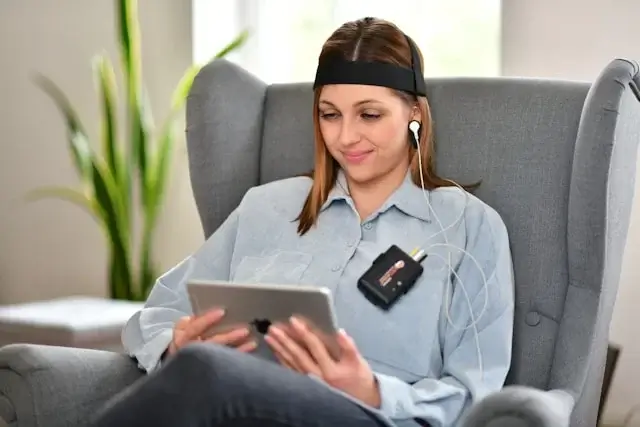Unlock Your Brain's
What Can Neurofeedback Help With?
Neurofeedback therapy is a cutting-edge brain training technique that can assist with a variety of mental health and neurological conditions. Whether you’re dealing with anxiety, depression, ADHD, or sleep disorders, neurofeedback may offer relief. It’s also beneficial for stress management, cognitive enhancement, and improving overall mental performance. This non-invasive brain training method is suitable for both children and adults, making it a versatile option for anyone seeking to optimize their brain function. You don’t have to stop taking medication while doing neurofeedback, but many will have that as a goal of their training. Here’s a couple of studies you may be interested in that validate neurofeedback.
Anxiety and Depression
Helps regulate mood and emotional responses.
ADHD
Improves focus, attention, and behavioral control.
Sleep Disorders
Promotes better sleep patterns and reduces insomnia.
Stress Management
Reduces stress levels and enhances relaxation.
Cognitive Enhancement
Boosts memory, learning, and overall cognitive performance.
Chronic Pain Management
Assists in reducing pain perception and improving quality of life.
What is Neurofeedback?

How Does Neurofeedback Work?
EEG Monitoring: Small sensors are placed on the scalp to measure brainwave activity.
Real-Time Feedback: Brainwave data is displayed on a screen, providing visual or auditory cues.
Training Sessions: Individuals learn to modify their brainwave patterns through guided exercises, promoting healthier brain function over time.
Frequently Asked Questions
Neurofeedback offers a range of benefits, including enhanced mental health, reduced anxiety and depression, better stress resilience, improved cognitive function, increased focus and attention, better sleep quality, and personalized brain training.
By normalizing brainwave patterns associated with mood disorders, neurofeedback can help alleviate symptoms of anxiety and depression. It also helps the brain manage stress more effectively, promoting a sense of calm and relaxation.
Think of neurofeedback as going to the gym, just for your brain. So, you can expect to possibly be tired after training. Occasionally, we see headaches which are important to share with me before we train again. Rarely, in people who have seizures, neurofeedback can increase seizures. That’s why I look at your brain beforehand to make sure your a good candidate for neurofeedback. We can also train your brain not to have seizures but only with the approval of your neurologist.
Yes, neurofeedback can improve cognitive function by enhancing attention span and reducing impulsivity, especially beneficial for individuals with ADHD. It also regulates brainwaves, which can improve sleep patterns and help with insomnia.
Yes, neurofeedback sessions are customized based on your specific brainwave patterns and goals, ensuring a personalized approach to brain training. We start by taking a reading, called a QEEG of your brain so we can tailor training to your specific brain and needs.
We tend to sound like your orthodontist when we say….it depends. If you’re dealing with a severe brain issue, it make take months or a year. If you’re dealing with smaller issue, it may only take a couple of sessions. For the issues we’ll treat, you’ll see relief and then extinction of the symptoms in 20-40 sessions.
No, our brains are wonderful and in most cases, will continue to remain trained and symptom free. On occasion, someone will come in for 2-3 sessions after a year for a tune-up. But after that, their brain reverts back to where we want it.
Learn More

About England Therapy
© England Therapy 2025, All Right Reserved
